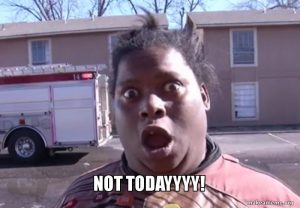What’s a Bounce?
Well at surface level, a bounce is when a user comes to your site and with no interaction, leaves. Whether they hit the back button or close the window or turn-off their computer or maybe even throw it out the window, it’s all a bounce.
What else is a bounce?
When I think about bouncing visitors what immediately comes to my mind is this: What were they expecting? What did they get? A bounce is really just a missed expectation. They thought they were going to get something that they didn’t and they bounced!

So how do I lower my bounce rate?
Often easier said then done, but it really comes down to matching users intent and expectations. If they click through to your site from a link about cat-herding and land on a page selling turtle backpacks then that’s a clear fail. Do your headlines match your anchor text? It’s like that old misogynistic cliche: “Do the drapes match the curtains?” It’s all about matching your users expectations with every click. Every page load you have a change to earn or hurt trust, when your messaging remains consistent so do your trust signals.
The only way to improve anything is to be able to accurately measure it. So first make sure you have a handle on what your actual bounce rate is. I recommend setting up triggers on your pages that record 5 second actions, since someone sitting on your page for 5 seconds is probably reading and if they leave, is that really a bounce? Maybe if you consider reading not an interaction, but I would since that’s how most people interact with a site in the first 5 seconds. So if they leave before that, I’d definitely consider that a bounce. Google analytics however by default will count it as a bounce if they don’t interact and leave, so a timer/action is a good way to get a handle on a more accurate bounce rate.
Once you have an accurate rate determined, I’d start examining where they’re coming from? How can you better match the experience they’re expecting? Should they even be on your site? Maybe losing them isn’t a bad thing since they’re not really coming for the right reasons!?!

If you paid for this traffic, then I’d suggest tightening up some of those keywords or using some negative keywords. If they’re coming from organic searches what terms brought them to you? Are they relevant to your site? Do you see how they could have ended up there? Once you figure out some of those details you can better mold your content, site structure and everything else to better match their intent.
What’s a good bounce rate?
Well obviously zero would be awesome! But bounce rate is a lot like a diet, you want to cut as much as possible but know that zero is impossible. Depending on the goals of the site, whether it’s e-commerce or not can have a large affect as well as how you define what a bounce is. Most sites I work with have been able to achieve an average bounce rate of under 8%. What’s your bounce rate? How you define what a bounce is?
Web Developer
eCommerce Usability Optimization Expert
PNW Native, Outdoor Enthusiast and Overlander.